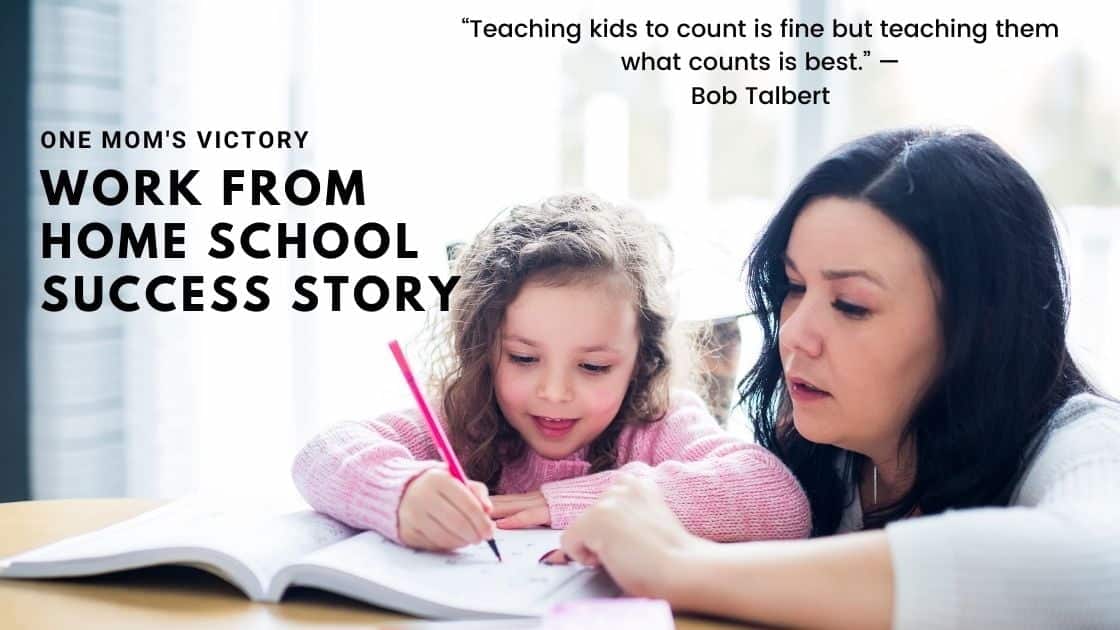
“Teaching kids to count is fine but teaching them what counts is best.” —Bob Talbert
Homeschooling today is more popular than ever before, but not necessarily out of choice. COVID changed the trajectory for parents and children around the country, with millions of families becoming homeschooling families whether or not they chose it.
But the homeschool movement was growing long before March 2020, when it was forced upon children countrywide. Millions of parents already mastered the homeschool and work-from-home phenomenon, including Paula who works with our company.
Today, we talked to Paula to learn more about how she mastered working from home and homeschooling her three children, who are now successful adults and college graduates (2 from Texas A&M and one from Baylor University).
Paula set the bar high with a 3 for 3 track record of success. She helped us understand what it takes to be successful working from home while homeschooling three children.
The Push for Homeschooling and How to be Successful
Since COVID, most parents are homeschoolers, but the movement began long before then. Teaching has always been a parent’s number one job because it shapes our children’s future, and the future of our world.
When you homeschool and work from home, you do both – but how do you make it happen?
It comes down to organization. Paula stressed that this is the number one rule. If you can’t be organized, how can you expect your children to be organized? Homeschooling teaches children many skills they wouldn’t learn in traditional school because it’s a structured environment where they have full access to a teacher and their classmates.
At home, children have access to parents, but on a lesser scale because they have to work too. It’s a balance both parents and children must learn.
Paula gave us quite a few great tips that helped her through the years. Her oldest is now in his 30s and is a successful adult that’s gainfully employed and successful. Here’s what she suggests:
- Give kids dedicated times to focus on their work without adult interaction. You both need time to work on your responsibilities. Whether you create a set schedule or work in-the-moment, make sure there are plenty of opportunities where you can separate and work on your items.
- Teach kids how to problem solve. As adults, they have to know how to manage their problems without immediately seeking help. Homeschooling provides great opportunities to teach this. Give your children dedicated times they cannot access you, for example, 10 AM to 12 PM. Let them know this is your dedicated work time, whether to make phone calls or work uninterrupted. They can ask questions after that time, but in the meantime, they must problem solve and/or write their questions down to ask later.
- Don’t be afraid to join networks. Just like it takes a village to raise kids, the same is true of homeschooling. You aren’t going to be an expert in everything and that’s okay. Paula, for example, was an expert at algebra but wasn’t great at writing. She had to reach out to other resources to get what her kids needed to give them the skills they need. It’s okay to reach out, and remember, it benefits your children.
- Find outlets for creative classes. Give kids an outlet by signing up with networks for the non-core classes, such as music and art. Kids love these classes as it gives them time to be creative and not so ‘serious.’ You can find remote options as well as in-person options, suiting whichever helps your child the most.
- Sign kids up for other activities. As restrictions ease up, kids can join other clubs or activities that give them the social interaction they need. Think of what your child loves and find an activity or group they can join. Whether your child joins church youth groups (this is where Paula’s kids made their best friends), sports activities, or even art classes, there’s something for everyone.
Getting College-Ready
If you have older children, you may worry about how they’ll get into college if you homeschool. This was one of Paula’s largest concerns too, and a challenge she cites as being the most stressful.
Before now, homeschooling wasn’t quite as recognized, but thousands of children still made it into college, including Paula’s kids.
While each child has different abilities and passions, Paula credits her children’s success in going to college with signing them up for the local dual credit program offered at her community college. Many schools offer this, and it is a great way to make sure your children are college-ready if that’s the path they choose. This program is often available starting at age 15, but check out your local offerings to get more specifics.
How to be Successful Working from Home and Homeschooling
So what’s the bottom line?
Make sure you teach your kids. It doesn’t have to look a certain way – each child is different. Choose your child’s strengths and focus on them. These are the easiest for you to manage and teach. When your child feels empowered, he/she is more likely to be self-sufficient in these areas.
Know your strengths and weaknesses too. We all have subjects that just aren’t our thing, and that’s okay. Be willing to reach outside of your home and bring in support. Find ways to enrich your child’s education, giving them a chance to be well-rounded and/or find their passion in something that may or may not be ‘your thing.’
Most important, start small. Don’t rush it. Homeschooling and working from home are big changes in your life and your child’s. While your child may be forced home due to COVID, you may have more flexible options that help you ease into your new role so that you don’t get too overwhelmed and yet can help your child get his/her ‘street smarts’ and a solid education.
About the Author

Tracie Chancellor, CEO and Founder of TeleReach Corporate, national business to business call center specializing in sales appointment setting and lead generation, based in Houston, Texas. Chancellor is an MBA graduate of the University of Houston with over 20 years hands-on sales and marketing experience, working with privately-held businesses, universities, non-profit organizations, as well as Fortune businesses in the business to business marketing space.

